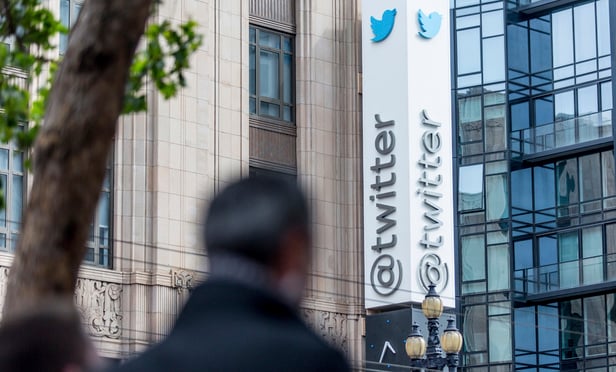Judge Reconsiders Ruling for Twitter in Transparency Suit After Government Hands Over Classified Evidence
After receiving an in camera filing from the government, U.S. District Judge Yvonne Gonzalez Rogers indicated she thinks information that Twitter is seeking to publish about government requests "would pose grave or imminent harm to national security" if made public.
June 21, 2019 at 12:58 PM
4 minute read
The original version of this story was published on The Recorder
 Twitter headquarters, located at 1355 Market St., San Francisco. (Photo: Jason Doiy/ALM)
Twitter headquarters, located at 1355 Market St., San Francisco. (Photo: Jason Doiy/ALM)
A federal judge in Oakland has indicated that she's likely to side with the federal government in its long-running dispute with Twitter Inc. over how much the company can disclose about national security-related requests from the government.
U.S. District Judge Yvonne Gonzalez Rogers of the Northern District of California wrote in an order issued Friday morning that the government presented her with new evidence in March arguing there was a reasonable expectation that information Twitter is seeking to publish “would pose grave or imminent harm to national security” if made public.
The new evidence, a declaration filed only to the judge in March by Michael C. McGarrity, acting executive assistant director of the National Security Branch of the Federal Bureau of Investigation, has not been seen by Twitter's lawyers at Mayer Brown. Rogers wrote Monday that she was inclined to conclude that it “cannot be disclosed to counsel for Twitter based upon the national security concerns it raises.”
In an emailed statement, a spokesperson for Twitter said that the company is committed to transparency with its users about how it interacts with governments, including the United States.
“We believe it is vital that the public see the demands we receive, and how we work to strike a balance between respecting local law, supporting people's ability to Tweet and protecting people from harm,” the Twitter spokesperson said. “While Twitter is disappointed by the Court's latest order, we will continue to fight for meaningful transparency. We encourage all users and the public to review our biannual Transparency Report to learn more about our efforts,” the spokesperson said.
Twitter filed suit in October 2014 after federal officials refused to allow the company to publish a draft of its transparency report detailing the number and types of requests the company had received for user information. In particular, the government claimed that the number of national security letters and court orders under the Foreign Intelligence Surveillance Act of 1978 issued to Twitter was classified.
Rogers initially dismissed the suit in late 2015, finding that it was moot after the passage of the USA Freedom Act loosened the government restrictions on publishing some aggregated data. Rogers, however, allowed the company to amend its claims.
 U.S. District Judge Yvonne Gonzalez Rogers (Photo: Jason Doiy/ALM)
U.S. District Judge Yvonne Gonzalez Rogers (Photo: Jason Doiy/ALM)In July 2017, Rogers denied the government's request for summary judgment in the suit finding that the government's prohibition on publishing Twitter's transparency report amounted to a prior restraint of the company's free speech rights. In Friday's order to show cause, Rogers indicated that she was reconsidering the summary judgment ruling in light of the declaration the FBI's McGarrity filed in camera in March.
“Drafted to support the Government's assertion of the state secrets privilege, the declaration provides an explanation of the Government's basis for restricting the information that can be published in the Draft Transparency Report, and the grave and imminent harm that could reasonably be expected to arise from its disclosure, in far greater detail than the Government provided previously,” the judge wrote.
Rogers found that the declaration met the government's burden to justify classification and restrict disclosure and “that no more narrow tailoring of the restrictions can be made.”
DOJ representatives didn't immediately respond to a request for comment.
This content has been archived. It is available through our partners, LexisNexis® and Bloomberg Law.
To view this content, please continue to their sites.
Not a Lexis Subscriber?
Subscribe Now
Not a Bloomberg Law Subscriber?
Subscribe Now
NOT FOR REPRINT
© 2025 ALM Global, LLC, All Rights Reserved. Request academic re-use from www.copyright.com. All other uses, submit a request to [email protected]. For more information visit Asset & Logo Licensing.
You Might Like
View All
Litigators of the Week: A Knockout Blow to Latest FCC Net Neutrality Rules After ‘Loper Bright’

An ‘Indiana Jones Moment’: Mayer Brown’s John Nadolenco and Kelly Kramer on the 10-Year Legal Saga of the Bahia Emerald

Litigators of the Week: A Win for Homeless Veterans On the VA's West LA Campus

'The Most Peculiar Federal Court in the Country' Comes to Berkeley Law
Trending Stories
- 1Perkins Coie Lures Former Longtime Wilson Sonsini Tech Transactions Partner
- 2‘The Decision Will Help Others’: NJ Supreme Court Reverses Appellate Div. in OPRA Claim Over Body-Worn Camera Footage
- 3MoFo Associate Sees a Familiar Face During Her First Appellate Argument: Justice Breyer
- 4Antitrust in Trump 2.0: Expect Gap Filling from State Attorneys General
- 5People in the News—Jan. 22, 2025—Knox McLaughlin, Saxton & Stump
Who Got The Work
J. Brugh Lower of Gibbons has entered an appearance for industrial equipment supplier Devco Corporation in a pending trademark infringement lawsuit. The suit, accusing the defendant of selling knock-off Graco products, was filed Dec. 18 in New Jersey District Court by Rivkin Radler on behalf of Graco Inc. and Graco Minnesota. The case, assigned to U.S. District Judge Zahid N. Quraishi, is 3:24-cv-11294, Graco Inc. et al v. Devco Corporation.
Who Got The Work
Rebecca Maller-Stein and Kent A. Yalowitz of Arnold & Porter Kaye Scholer have entered their appearances for Hanaco Venture Capital and its executives, Lior Prosor and David Frankel, in a pending securities lawsuit. The action, filed on Dec. 24 in New York Southern District Court by Zell, Aron & Co. on behalf of Goldeneye Advisors, accuses the defendants of negligently and fraudulently managing the plaintiff's $1 million investment. The case, assigned to U.S. District Judge Vernon S. Broderick, is 1:24-cv-09918, Goldeneye Advisors, LLC v. Hanaco Venture Capital, Ltd. et al.
Who Got The Work
Attorneys from A&O Shearman has stepped in as defense counsel for Toronto-Dominion Bank and other defendants in a pending securities class action. The suit, filed Dec. 11 in New York Southern District Court by Bleichmar Fonti & Auld, accuses the defendants of concealing the bank's 'pervasive' deficiencies in regards to its compliance with the Bank Secrecy Act and the quality of its anti-money laundering controls. The case, assigned to U.S. District Judge Arun Subramanian, is 1:24-cv-09445, Gonzalez v. The Toronto-Dominion Bank et al.
Who Got The Work
Crown Castle International, a Pennsylvania company providing shared communications infrastructure, has turned to Luke D. Wolf of Gordon Rees Scully Mansukhani to fend off a pending breach-of-contract lawsuit. The court action, filed Nov. 25 in Michigan Eastern District Court by Hooper Hathaway PC on behalf of The Town Residences LLC, accuses Crown Castle of failing to transfer approximately $30,000 in utility payments from T-Mobile in breach of a roof-top lease and assignment agreement. The case, assigned to U.S. District Judge Susan K. Declercq, is 2:24-cv-13131, The Town Residences LLC v. T-Mobile US, Inc. et al.
Who Got The Work
Wilfred P. Coronato and Daniel M. Schwartz of McCarter & English have stepped in as defense counsel to Electrolux Home Products Inc. in a pending product liability lawsuit. The court action, filed Nov. 26 in New York Eastern District Court by Poulos Lopiccolo PC and Nagel Rice LLP on behalf of David Stern, alleges that the defendant's refrigerators’ drawers and shelving repeatedly break and fall apart within months after purchase. The case, assigned to U.S. District Judge Joan M. Azrack, is 2:24-cv-08204, Stern v. Electrolux Home Products, Inc.
Featured Firms
Law Offices of Gary Martin Hays & Associates, P.C.
(470) 294-1674
Law Offices of Mark E. Salomone
(857) 444-6468
Smith & Hassler
(713) 739-1250






